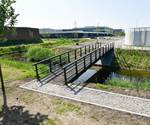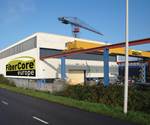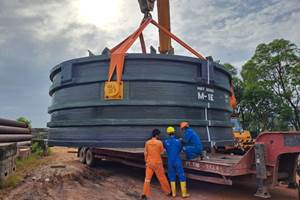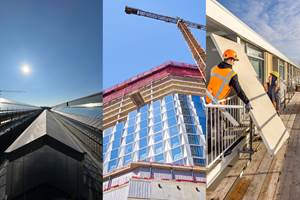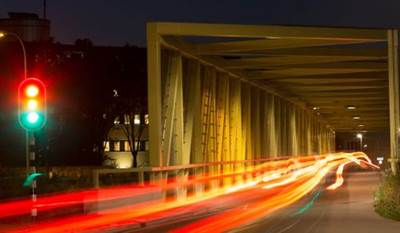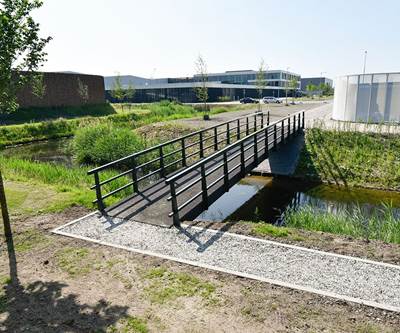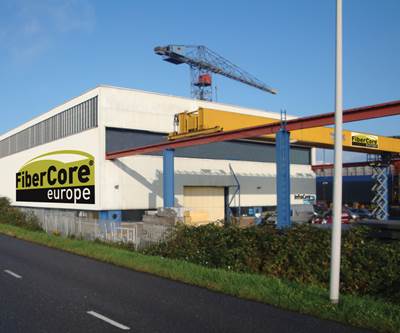FiberCore Europe partners with Sustainable Infrastructure Systems to produce composite bridges in Australia
Patented technology used in more than 900 bridges and lock gates worldwide will have up to 40% recycled plastic by 2021.
Sustainable Infrastructure Systems (SIS, Adelaide, Australia) delivers sustainable infrastructure projects for diversified clients around the world. With over 20 years of experience, SIS is also a market leader in delivering sustainable alternatives for applications in oil & gas, mining, aviation, aquaculture, marine & ports, transport & logistics and agriculture.
SIS is formalizing a manufacturing partnership with Europe’s most successful producer of lightweight fiber-reinforced composite bridges and road decks, FiberCore Europe (Rotterdam, The Netherlands). A world leader in the manufacture and installation of fiber-reinforced polymer (FRP) bridges and lock gates, FiberCore Europe’s InfraCore Inside technology enables composite structures that meet all standards and government requirements while providing a practically maintenance-free service life of 100 years. More than 900 bridges and lock gates — from bicycle and pedestrian bridges to the world’s longest bridge span in composites — have been installed in The Netherlands, Belgium, England, France, Italy, Sweden, Norway, China, the USA and now in Australia.
SIS and FiberCore Europe together will form a national center for the manufacture of innovative, lightweight composite bridges, including construction and delivery of sustainable, FRP structures in Australia and regional Oceania nations. SIS will draw on its strategic distribution capabilities with partners in Melbourne, Sydney, Brisbane and Perth, and it also has manufacturing partnerships in Australia, China, North America and Europe. SIS and FiberCore Europe have already completed fabrication, supply and installation of four FRP composite golf bridges in Australia. The InfraCore Inside Technology is now implemented in shipbuilding, offshore facilities and general industry.
Four bridges installed in four hours
In Juy, SIS and FiberCore Europe completed the delivery and installation of four clear-span, single-element FRP bridges for a major golf course re-shaping project at the Castle Hill Country Club course in Norwest, just outside Sydney.
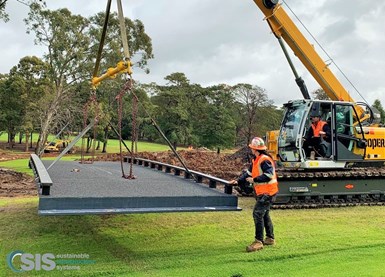
Four bridges installed in four hours.
The bridges are an important part of a $4.4 million course redevelopment featuring an open creek environmental water collection system on the club’s 167-hectare bushland facility. Installation of the four FRP bridges was completed in only four hours, despite inclement weather that required using a crawler tracked Sennebogen 613e crane from Coopers Heavy Industries to minimize damage to the playing surfaces.
“We needed a course upgrade, but we are on a flood plain so we opted for a creek system to cope with rainwater runoff and consequently needed bridges. We did not want obtrusive bridges made of sandstone with large pipes and critically wanted no maintenance,” said club president Hugh Haslehust-Smith. “The speed of installation has given us an unexpected extra day at a critical time,” added course superintendent Mitch Brooks. “Good product, easy to install, looks great.”
“The course improvement program is on time and in budget with three to four months to go. We were looking at a number of bridges and we selected a product that was not in Australia but the specs added up to what we needed, the process seemed a lot simpler than other builds and it’s a quality product at a very good price. It blends with the environment and is engineered to carry the maintenance machinery loads we need to move around the course,” noted Castle Hill Country Club General Manager Duncan Walker.
Next steps for FRP bridges in Australia
“The next step is to bring the production of these FRP bridges to Australia under a manufacturing license agreement with FiberCore Europe,” explains SIS director of structures, Nick Wotton. “This will significantly reduce freight costs and lead times for our clients and will revolutionize the way bridges are manufactured and installed in Australia. Staying with the company’s ethos, our goal is to have all structures being manufactured with up to 40% recycled post-consumer waste plastic by 2021.”
Wotton has been involved in the Australian sustainable product sector for 24 years, mainly through recycled plastic and recycled wood-plastic composite products and structures. He was responsible for the design and construction of Australia's first bridge made entirely of recycled wood plastic composite and is regarded as an Australian pioneer in using recycled plastic to make sustainable products, including the product that won the 2008 Best Green Product at the Infrastructure Australia Awards.
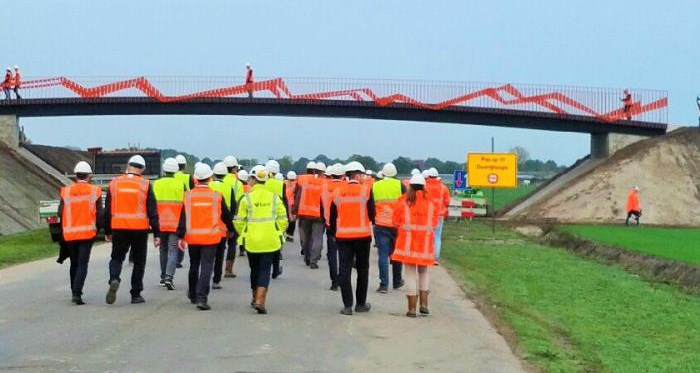
FiberCore was commissioned by the province of Noord-Brabant to build this 37 meter clamped composite bicycle bridge on the Gemert Noord-Om highway project in The Netherlands. SOURCE | FiberCore Europe
Wotton coordinates a team of highly skilled professionals including designers, engineers and product development personnel. “We now have an agreement in place with FiberCore Europe to set up a manufacturing facility here, using recycled content to create fully recyclable, locally manufactured bridges, deck panels and road decks that have a 100-year design life. Without manufacturing uses for processed recycled materials, the circular economy simply doesn’t work and with our bridges we plan to use a large amount of post-consumer waste plastic that could otherwise be sent to landfill.”
Wotton says SIS is currently in talks with other progressive Australian companies and individuals with a view to further partnerships. “There are many advantages of low-weight FRP Bridges,” he explains, citing the ability to minimize on-site safety risks. “Bridge construction is completed off-site in controlled-environment manufacturing facilities, which also increases quality, allows for more predictable costs and minimizes complications that can arise with construction on-site. Off-site production also reduces disruption to the surrounding road and rail infrastructure during installation.”
Dutch bridge experts presented paper at Australian conference
In April 2019, SIS invited FiberCore Europe to present at the National Bridges Conference in Queensland. Dr. FiberCore Europe general manager Mr. Jan Kroon and Martijn Veltkamp, FiberCore Europe’s senior design engineer and a European leader in FRP bridge design addressed the conference delegation, including more than 300 engineers and designers from Australia and New Zealand. SIS and FiberCore representatives were then invited to the Research Centre for Future Materials at the University of Southern Queensland, School of Civil Engineering.
Dr. Veltkamp highlighted key features of FRP single-element bridge construction with a review of a major completed project for the City of Rotterdam that involved the design, construction and installation of 62 FRP bridges. All bridges share the same design ‘language’ but have different geometries, making full use of FRP’s versatility and cost-saving benefits in bridge design, construction and installation, as well as virtually maintenance-free operation for 100 years of maximum-load service life.
Related Content
Composite SIPs for more affordable, efficient and sustainable buildings
LiteSIP panels and modules enable framing in days, cutting structural labor and total cost by up to 70% and 30%, respectively, while increasing energy efficiency and durability.
Read MoreComposites end markets: Infrastructure and construction (2024)
Composites are increasingly used in applications like building facades, bridges, utility poles, wastewater treatment pipes, repair solutions and more.
Read MoreNorco GFRP molds meet high-quality cast concrete beam production needs
A project with P&M successfully achieved manufacture of six 20-meter-long architectural beams for an R&D facility with near-seamless surfaces and on a tight production schedule.
Read MoreBio-based, fire-resistant composites become mainstream
Projects use Duplicor prepreg panels with highest Euroclass B fire performance without fire retardants for reduced weight, CO2 footprint in sustainable yet affordable roofs, high-rise façades and modular housing.
Read MoreRead Next
Disruptive composite infrastructure
FiberCore Europe claims the "Holy Grail" of delamination-resistant FRP bridge and infrastructure components with its patented InfraCore technology.
Read MoreBio-based composite bridge in The Netherlands
This summer, FiberCore Europe joined forces with TU Delft and Schiphol Logistics Park, and other firms and local agencies, on the design and construction of an ecologically sustainable composite footbridge made with bio-based materials.
Read MorePlant Tour: FiberCore Europe, Rotterdam, The Netherlands
From debond-proof bridges to cost-saving infrastructure rehab, InfraCore technology is establishing composites as the fourth major construction material.
Read More


